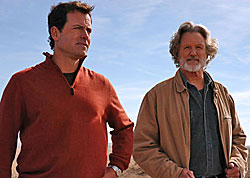‘Fast Food Nation’: You are what you eat, but what are you eating?
Are we what we eat? If so, the truth may be hard to swallow according to this movie’s tag line. “Fast Food Nation” is a drama based on Eric Schlosser’s book and directed by Richard Linklater who also helped write the screenplay. The movie, however, is barely deserving of the title “Fast Food Nation.” Schlosser’s book, voted favorite book by Powell’s Bookstore staff members in 2001 and considered a social phenomena, is an in-depth look at society and how it’s evolved. Schlosser raises concerns about Americans’ lack of knowledge about where food is from and by whom and how it’s made. Americans don’t know or seem to care about the true costs of food and just how far food giants will go to save a penny all in the name of profit – which is why you should see the movie. Next time you are in the mood for a juicy burger, fries dripping in trans fat, and a smooth strawberry shake, you’ll at least know where it’s from. The film takes place in Cody, Col. Don Anderson (played by Greg Kinnear) is the young executive and inventor of McDonald’s. He is distracted by current reports of higher than normal levels of the deadly E-Coli bacteria present in McDonald’s hamburgers. He abandons his family commitments and sets out to see for himself what’s going in the cutting-edge slaughterhouse in Colorado where the “big ones” are from. From there, the movie centers around the McDonald’s franchise in Cody and tells a story about some of the families that work for McDonald’s at the executive level, as well as several of the teenage minimum wage workers that flip the burgers and take orders at the counter and the people that work in the slaughterhouse who prepare the meat for the hamburgers that get served at the restaurant chain. Raul (played by Wilmer Valderrama) and Sylvia (played by Catalina Sandino Moreno) are married and illegally immigrate to Colorado on foot to find a better life in the United States. We are left to wonder why they are leaving Mexico and have no idea what they are leaving behind. Sylvia gets a minimum wage job at a hotel and Raul gets hired at UMD, the local slaughterhouse. They scheme to bring their two sons into the United States to join them later. The slaughterhouse is a stinking place to work but the pay is good. Most of the employees are overworked illegal immigrants who use drugs to stay awake on the job and/or escape the misery. The stench is so bad that the training supervisor tells trainees to breathe from their mouths. The other family in the film is a single mom, Alice (played by Avril Lavigne) and her young ambitious teenage daughter Amber (played by Ashley Johnson). Amber is a hardworking high school student and gets a job at the local McDonald’s in Cody. The movie raises issues about immigration, slaughterhouse conditions, rising eco-terrorism and what we eat. It leaves us wondering whether what is happening behind the scenes at McDonald’s isn’t really all right. An accident happens in the beef-cutting assembly line and the company, rather than honor and pay the family for the heinous accident, instead neglects their responsibility and loyalty to its workers.Some of the scenes at the slaughterhouse, especially the kill line, are hard to stomach. But it demonstrates the need for additional government regulation due to the environmental risks, the health risks of slaughterhouse employees and raises a social consciousness about many of the unseen risks we take everyday with every bite we eat. Some of the acting was a bit over the top, such as when Harry Rydell (Bruce Willis) tries to convince Don that we’ve been eating shit in our food all along and that it’s okay as long as its cooked adequately. This begs the question: Do the Rydells’ of the mega fas food industry really believe and justify that? Or are we as consumers being bamboozled? The movie brings out the dark side of the tremendous risks that immigrants take crossing borders and taking on risky grueling and grotesque factory jobs that nobody else wants. The movie does what Schlosser’s book intended to do in raising a higher level of social consciousness but it’s only one vein of his brilliant exposé of the fast food industry. The movie is rated R for disturbing images, strong sexuality, language and drug content.
|
